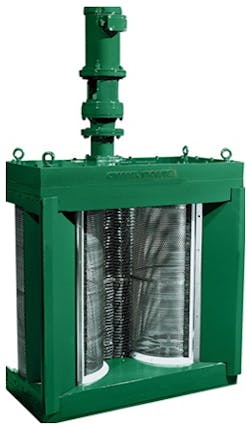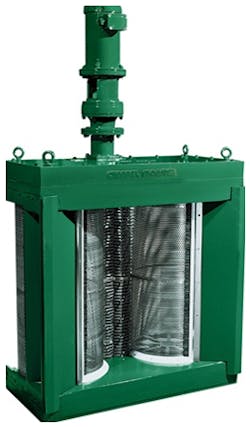Case Study: JWC's Channel Monster grinder keeps wipes at bay in Billerica, MA
Sept. 22, 2015 -- The city of Billerica, Mass., embodies an ideal American suburb -- picturesque streets, quaint houses, inviting storefronts, and a central city square perfect for socializing with fellow neighbors and visitors. Located just 50 minutes north of Boston, Billerica is also a prime spot for young families who want the convenience of a close-by city with the atmosphere of a restful community.
As the population has grown over the last few decades -- hitting just over 40,000 at the last census -- so has the amount of debris flowing through the area's wastewater treatment system, especially the amount rags and "flushable" wipes. This extra influent was causing undue stress, equipment damage and unscheduled maintenance at one of the area's largest pump stations, and the city looked to a waste-reduction solution that would permanently eliminate these problems.
Pumps Plagued by Wipes
Out of the 22 lift stations in the city, the Brown Street Pump Station is one of the largest, with a max flow rate of 5.6 million gallons per day (MGD). The facility comprises two pumps (duty/standby), with an option for a third pump. Brown Street is near the end of the city's pump station line, and no significant equipment upgrades have been made since the facility was originally built in the 1970s. Both the location and the age of the station have made the clogging problems associated with wipes especially troublesome.
"Dealing with wipes has been nothing but a nightmare," said Mike McCaughey, collections supervisor for Billerica. "Brown Street has a 24-inch pipeline leading into the station, and when there's not enough, flow rags just build up inside the pipe. Then, during periods of heavy rain, a slug of stormwater rushes through the pipeline, and all the rags hit the pumps at once."
This influx of wipes and rags would also cause issues during routine cleanings of the wet well. Once the maintenance crew broke up the matted grease and wipes at the top of the chamber, this debris would rush through the pumps at the same time.
During peak storm times, McCaughey and his crew were clearing wipes out of the pumps at Brown Street as often as three times per day. This necessitated a total system shutdown so the pumps could be taken offline, disassembled and cleared of the blockages, and then restarted. Not only was this process time and labor intensive, continual restarting caused significant strain and stress on the pump itself -- particularly for seals and bearings, which are prone to failures after frequent startups.
McCaughey looked for a solution that would protect the pumps at Brown Street -- and the remaining pump stations downstream -- without inhibiting flow or requiring a major system redesign.
Simple Solution Restores Efficiency
McCaughey's top priorities for choosing a solution to combat wipes at Brown Street were ease of installation into the existing system, cost and long-term reliability. He had previously worked with Aqua Solutions, Inc., a local provider of wastewater and water treatment products and design solutions, to install sewage grinders in the area's newer pump stations.
The city had been pleased with the grinders at those facilities and noted that clogging and blockage issues were virtually eliminated after the installation. Jim Deluca, president of Aqua Solutions and manager of the Brown Street upgrade, recommended the new Channel Monster® model Wipes Ready grinder from JWC Environmental.
The grinder comprises rotating screening drums with 1/2-inch (12-mm) perforated openings, which feed debris into a dual-shafted grinder to fully shred solids while maintaining proper flow rates so capacities at pump stations are not compromised by clogs and equipment breakdowns.
"The grinder made a huge difference," said McCaughy. "We've gone two months without ever pulling the pumps, and they're running much more effectively." McCaughey found the system to be a durable, economical and versatile solution to protect the Brown Street pumps and pipelines.
Since the installation of the Channel Monstermodel Wipes Ready in 2014, the need for daily pump maintenance has been eliminated. Maintenance crews no longer have to take time away from planned projects in order to service the pumps at Brown Street and manually remove the clogs and ragballs from the equipment.
See also:
"Shredding Waste into Profits: Grinders Help Waste-to-Energy Facilities Stay Productive"
"Product - JWC Grinder"
About JWC Environmental
JWC Environmental designs, builds and services dependable waste shredders and screening systems to help its customers solve challenging waste reduction and recycling applications. With a global presence and four decades of experience, the company works closely with customers to ensure successful projects. Likewise, it assists customers in the energy, wastewater, recycling, marine, and facility management sectors, to name a few. For more information, visit www.jwce.com.
###


